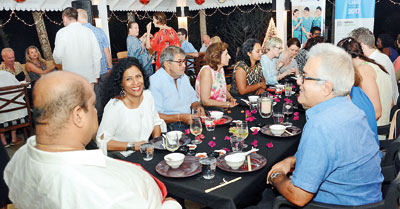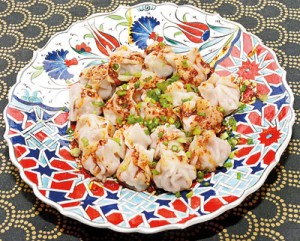Dining with Dunlop savouring the food she loves to cook

Chinese food and conversation: Guests at Why House. Pix by M.D. Nissanka
“What is the most disgusting thing you have ever eaten?”
Fuchsia Dunlop is taking questions, and it’s the first thing someone wants to know. I wonder for a moment whether a chef working in any other culinary tradition (Dunlop’s specialty is Chinese food) would be asked such a question and if she ever tires of people reducing it to a caricature of a culture that eats everything that moves, or one that doesn’t offer much more than fried rice and sweet and sour chicken.
But Dunlop is expert at this – she talks about eating duck tongues and has written about eating rabbit heads (eyeballs, brains and all), but she pauses here to point out that the prejudice goes both ways. Many Chinese people she knows think Western food can be disgusting, bland and strange. There’s a story she likes to tell of a Chinese friend confessing to her that he didn’t like Western food at all. Dunlop, knowing there were not many Western offerings anyway in their Chinese city asks him how he has come to this conclusion. He tells her he once tried KFC.
A burst of laughter greets her anecdote. We are all sitting around, ensconced in long tables under a pavilion in a garden in Talpe. Our hosts tonight are the team at The Why House – a ‘country’ home nearly 45 minutes away from the main festival hall in the Fort. We are greeted by the hotel’s mascot, a dachshund named Nigella, who wears a sparkly collar and a jaunty bow. Nigella and I are immediately fast friends, and she stretches and rolls as she offers me her tummy for a rub.
Our hosts have bravely taken on the cooking of some of Dunlop’s favourite dishes, including fish-fragrant aubergines, spinach in ginger and squirrel fish in sweet and sour sauce (a moment of rapture here for the crispy batter speckled with little sesame seeds and the pop of green peas in the mouth).
The plates of hongyong chaushau are my favourite of this elaborate menu. The skins of the dumplings, tenderly pleated; each stuffed parcel turned red and speckled with chilli by their baptism in a fiery sauce. My least favourite is dessert – billed as red bean soup, but as my friend notes, more akin to a bowl of dhal.
Hits outnumber the misses, luckily. It is clear Dunlop has chosen her menu with great care. Most of the dishes tonight were based on recipes taken from her book Land of Fish and Rice: Recipes from the Culinary Heart of China.
The book is the latest in a series of critically acclaimed publications from this much beloved author and journalist. Dunlop is often hailed as one of the world’s best food writers and has won four James Beard awards among numerous honours.

There is a balance to our meal tonight, a lightness to the sequence of dishes that ensures that when you stand up, you are not weighty and bloated, but satisfactorily full. Dunlop, who talks about China’s interest in healthy foods, the intellectual pursuit of good eating in this culture and the extraordinary skill and diversity evident in their different techniques is an utterly absorbing speaker.
This dinner is a first for me. The programme at the Fairway Galle Literary Festival is studded with gourmet events such as this one, and they’re all decidedly expensive – a ticket to tonight’s event costs Rs.8,000. But I think this particular event makes a kind of sense, because it is with a chef. There is a pleasure in actually eating what we are hearing about.
Having heard Dunlop talk while sitting at a table with her food, I think she is the kind of guide I love best when on a literary adventure; someone whose love and respect for the culture she is writing about comes from a deep familiarity born of years having lived in that place, of knowing its people, its language and its traditions.
If you’d like to get acquainted with Dunlop, the best place to start is perhaps her 2009 memoir Shark’s Fin and Sichuan Pepper. A few pages in, it’s already a new favourite. Dunlop writes that this is a book about the unexpected wonders of Chinese cuisine. It is also, she says, ‘the tale of an English girl who went to China, ate everything and was sometimes surprised at the consequences.’

Fuchsia Dunlop: Explaining the food she loves


